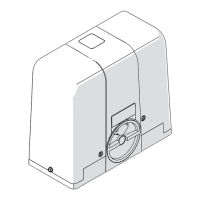BLIZZARD 400-800 C ENC 20 532104 - Rev.A
J17
J10
J7
2.5
J4
M
MOT
MOT
2.5
J18
34
35
36
37
38
Translation of the original instructions
ENGLISH
MOTOR TERMINAL BOARD (34)
Terminal board for connecting the electric motor.
The cable of the electric motor is connected at the factory.
ENCODER CONNECTOR (35)
Connector for connecting the encoder.
The encoder cable is connected at the factory.
Li
The encoder must always be connected in order for the automation
to operate.
BATTERY KIT CONNECTOR (36)
Connector for connecting the GENIUS battery kit (optional accessory).
Li
Battery kits with revision 1 are not compatible: the revision number
must be A1 or higher. Check the revision number on the label of the
battery kit board.
RQFZ RADIO MODULE CONNECTOR (37)
Rapid connector for plugging in the GENIUS RQFZ radio module
(optional accessory). Plug in the module only when the board is not
powered.
BUS PHOTOCELLS AND SAFETY EDGES
The SPRINT M24 board enables Bus photocells and safety edges to
be installed.
Connect the Bus devices in parallel to terminal J4 of the SPRINT M24
board (38). The Bus photocells and safety edges connection has
no polarity.
Li
The maximum permitted length for Bus G-Way cables is 100 m.
The standard mode of operation of the photocells and reverse on obsta-
cle function can be modified in Advanced Programming (
Ph, OP, IP).
TYPE STANDARD MODE OF OPERATION
Closing photo-
cells
Active during closing If engaged, reverse the movement during
opening
Opening
photocells
Active during opening If engaged, stop the gate and when
disengaged, reverse the movement
during closing
Opening
and closing
photocells
Active during both open-
ing and closing
If engaged, stop and when disengaged,
reverse the movement
Photocells
used as pulse
generators
Always active If engaged, send an OPEN command
Bus closing
edges
Active during closing When an obstacle is detected, they re-
verse the movement until the open posi-
tion is reached. At the second consecutive
obstacle the gate stops(
St = 02).
Bus opening
edges
Active during opening When an obstacle is detected, they
reverse the movement until the closed
position is reached.

